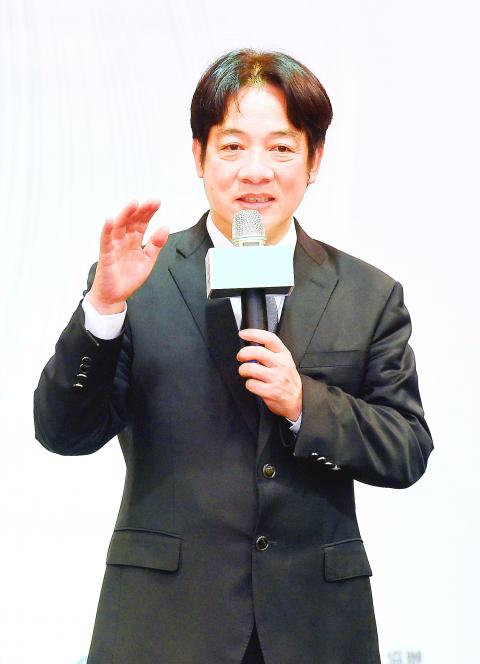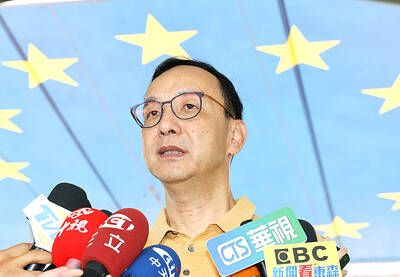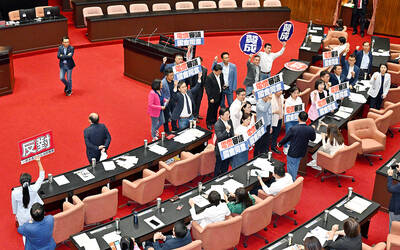As criticism from pro-Taiwan independence groups over the Democratic Progressive Party (DPP) government’s handling of a referendum on the national team’s name at the 2020 Tokyo Summer Olympics mounts in cyberspace, Premier William Lai (賴清德) yesterday defended his commitment to a pragmatic approach to Taiwanese independence.
An alliance of civic groups has initiated a referendum drive on renaming the national sports team from “Chinese Taipei” to “Taiwan” at the Tokyo Olympics and other competitions.
The DPP government’s perceived lack of support for the referendum has prompted charges that Lai is foxi (佛系) about Taiwanese independence, a Chinese Internet slang term referring to Buddha-like passivity and indifference toward a goal.

Photo: Chu Pei-hsiung, Taipei Times
Quoting Lai’s description of himself as a “political worker for Taiwanese independence” when he fielded questions from lawmakers at the Legislative Yuan in September last year, a group of pro-localization organizations last month called for Lai to lend his support to the proposed referendum.
In an interview yesterday with Web-based Yahoo TV, Lai said that Taiwanese independence through pragmatism is derived from and defined by the DPP’s “Resolution on Taiwan’s Future” ratified in 1999.
The resolution states that Taiwan is a sovereign and independent nation named the Republic of China (ROC) that is neither a subordinate of China, nor seeks to subjugate China, whose future can only be determined by the will of its people, he said.
There is nothing wrong with advocacy for renaming the nation’s Olympic team to “Taiwan,” Lai said, adding that proposal organizer Chi Cheng (紀政) competed under that name as an Olympian in 1960, 1964 and 1968.
However, while the government respects the advocates’ views, it is bound by the Lausanne Agreement, in which Taiwan’s Olympic committee consented to participate in Olympics under the name “Chinese Taipei,” he said.
“A lot of people are understandably dissatisfied that Taiwan has to participate in the Olympics as ‘Chinese Taipei’ under the terms of the Lausanne Agreement, but this is the reality of the situation and we have to protect our right to have our athletes participate in the Olympics,” he said.
Lai also said that the Cabinet is committed to President Tsai Ing-wen’s (蔡英文) cross-strait policy directives.
He reiterated Tsai’s official line that there would be no changes in goodwill, no changes in promises, no reversion to confrontation, no bowing to pressure and no compromising national sovereignty for expedient short-term interests that would jeopardize Taiwan’s free and democratic way of life.

GOOD DIPLOMACY: The KMT has maintained close contact with representative offices in Taiwan and had extended an invitation to Russia as well, the KMT said The Chinese Nationalist Party (KMT) would “appropriately handle” the fallout from an invitation it had extended to Russia’s representative to Taipei to attend its international banquet last month, KMT Chairman Eric Chu (朱立倫) said yesterday. US and EU representatives in Taiwan boycotted the event, and only later agreed to attend after the KMT rescinded its invitation to the Russian representative. The KMT has maintained long-term close contact with all representative offices and embassies in Taiwan, and had extended the invitation as a practice of good diplomacy, Chu said. “Some EU countries have expressed their opinions of Russia, and the KMT respects that,” he

An increase in Taiwanese boats using China-made automatic identification systems (AIS) could confuse coast guards patrolling waters off Taiwan’s southwest coast and become a loophole in the national security system, sources familiar with the matter said yesterday. Taiwan ADIZ, a Facebook page created by enthusiasts who monitor Chinese military activities in airspace and waters off Taiwan’s southwest coast, on Saturday identified what seemed to be a Chinese cargo container ship near Penghu County. The Coast Guard Administration went to the location after receiving the tip and found that it was a Taiwanese yacht, which had a Chinese AIS installed. Similar instances had also

CHANGES: After-school tutoring periods, extracurricular activities during vacations or after-school study periods must not be used to teach new material, the ministry said The Ministry of Education yesterday announced new rules that would ban giving tests to most elementary and junior-high school students during morning study and afternoon rest periods. The amendments to regulations governing public education at elementary schools and junior high schools are to be implemented on Aug. 1. The revised rules stipulate that schools are forbidden to use after-school tutoring periods, extracurricular activities during summer or winter vacation or after-school study periods to teach new course material. In addition, schools would be prohibited from giving tests or exams to students in grades one to eight during morning study and afternoon break periods, the

AMENDMENT: Contact with certain individuals in China, Hong Kong and Macau must be reported, and failure to comply could result in a prison sentence, the proposal stated The Chinese Nationalist Party (KMT) and the Taiwan People’s Party (TPP) yesterday voted against a proposed bill by Democratic Progressive Party (DPP) lawmakers that would require elected officials to seek approval before visiting China. DPP Legislator Puma Shen’s (沈伯洋) proposed amendments to the Act Governing Relations Between the People of the Taiwan Area and the Mainland Area (臺灣地區與大陸地區人民關係條例), stipulate that contact with certain individuals in China, Hong Kong and Macau should be reported, while failure to comply would be punishable by prison sentences of up to three years, alongside a fine of NT$10 million (US$309,041). Fifty-six voted with the TPP in opposition